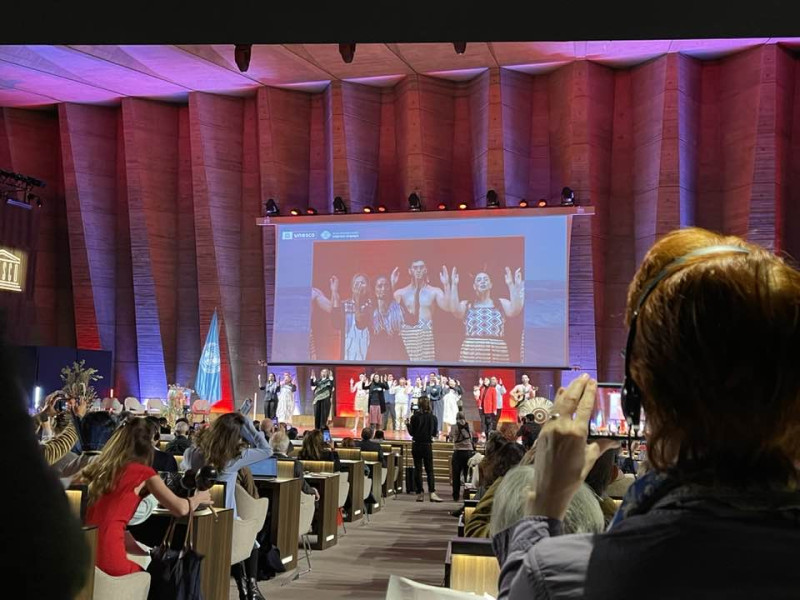Aotearoa leads way in language advocacy
Aotearoa leads way in language advocacy

(Picture caption: Celebrations take place in Paris for the UN International Decade of Indigenous Languages. Photo credit: Supplied.)
The message at the United Nations (UN) International Decade of Indigenous Languages launch in Paris has been heard, loud and clear.
Ministry for Pacific Peoples (MPP) Pacific Languages Unit manager Nafanuatele Lafitaga Mafaufau-Peters says collective action around the world is essential over the next 10 years if we are to succeed at reversing the downward trend for indigenous languages.
“As Māori Language Commissioner Professor Rawinia Higgins stated at the conference, ‘it takes one generation to lose a language, and three generations to recover a language’,” Nafanuatele says.
Representing MPP, Nafanuatele and fellow manager, Mary Tiumalu joined the Aotearoa New Zealand delegation in Paris in late December 2022 for the official launch of the International Decade of Indigenous Languages, which runs from 2022 to 2023.
Minister for Māori Development Hon Minister Willie Jackson, Professor Higgins, Te Taura Whiri i te Reo Māori (Maori Language Commission), Te Mātāwai, United Nations Educational, Scientific and Cultural Organisation (UNESCO) New Zealand Mission Culture Commissioner Dr Daniel Hikuroa, Chair of UNESCO Youth Leaders Ethan Jerome – Leota were also part of the delegation to Paris.
Participants at the launch included members of UN agencies, government representatives working in the field of languages, as well as indigenous leaders and activists.
The International Decade of Indigenous Languages is aimed at raising awareness and focus on the critical situation of many indigenous languages across the world and how to help revitalise, preserve and maintain them.
Nafanuatele says hearing the shared experiences of speakers from Norway, Samoa, Latvia, Ecuador, Russia, Saudi Arabia, Canada, Namibia, Chile, Bolivia, Colombia, Mexico and Aotearoa to name a few, confirmed the dire situation of the decline and extinction of indigenous languages and the challenge for communities fighting to save their dying languages.
“However, it was affirming to hear Aotearoa is deemed as progressive with the establishment, value and impact of Te Taura Whiri te Reo Māori, the call to action for the Government and people of Aotearoa to value Te Reo Māori.”
She adds the acknowledgement and commitment of the New Zealand Government to language revitalisation and maintenance of Pacific languages, is instrumental to the success of reviving the region’s indigenous languages.
“The Government and MPP have shown foresight in its efforts driving this work, specifically with the creation and implementation of the Pacific Languages Strategy in 2022,” she says.
“The Pacific Languages Strategy focuses on addressing the issue of urgent revitalisation for languages in danger of dying out, including the languages of the Realm countries - Tokelau, Niue and Cook Islands Māori.
“It allows for a coherent way for both government and community to work together, so the responsibility to reverse the decline, does not fall on communities alone.
“We now have a coordinated approach for government agencies and communities to work closely together to revitalise, maintain, strengthen and create awareness of Pacific languages in Aotearoa.”
When reflecting on the conference, Mary says there is still a long way to go in achieving the goals set out in the action plan.
“However, enforcing legislation, providing resourcing and capability building for communities are steps in the right direction – and we are already undertaking these steps for Te Reo Māori and the nine Pacific languages currently supported by MPP.”
At MPP, Pacific languages are recognised as a key cornerstone for the health and wellbeing of Pacific people.
History shows the loss of language can lead to a loss of culture and identity.
Since 2010, MPP has supported the Pacific Language Weeks series which promotes and raises awareness about the diversity of our Pacific languages in Aotearoa.
Each year, the Ministry works closely with Pacific communities’ to maintain and promote indigenous languages across the country, encouraging their use in our daily lives to help them thrive.
Mary adds the Pacific Language Weeks series was noted in the Leo Moana o Aotearoa Survey report as a top 10 enabler for language use.
“We have also heard from communities language weeks alone can’t reverse the decline of language use and transmission we are currently experiencing,” she says.
This year’s Pacific Language Weeks series gets underway in May with Rotuman Language Week.
To get involved, visit the MPP website for more information and resources.
